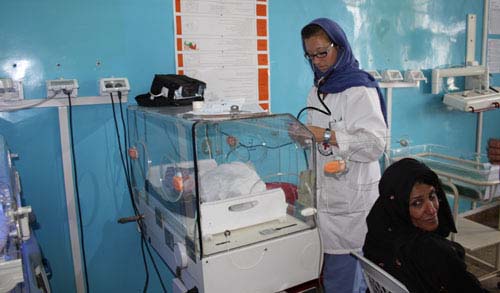The state of nursing in Afghanistan is pointed in a 2011 publication of American journal of nursing titled “Starting from scratch: Training nurses in Afghanistan” by Wielawski, that “Afghan nursing culture is considered to be about 75 years behind nursing culture in the United States”.Why does it sound that bad? Of course because of different reasons such as nurses in US or other developing and developed countries perform many roles; they are hospital nurse, leaders, and nurse practitioners holding masters and PhDs in nursing who are shaping the future of communities they serve. The purpose of showing Afghan and US culture is not to compare two dissimilar nursing cultures but to understand the state of our own nursing culture. Before going further, we will first understand nursing as a profession.
What is nursing?
According to International Council of Nurses, nursing encompasses independent and collaborative care of individuals, families, groups and communities, health or sick and in all settings. It also includes health promotion and disease prevention. Advocacy, promotion of a healthy environment, research, involvement in shaping health policy and health systems management, and education are also key nursing functions.This is a global definition of nursing which also indicates the importance of nurses in the society that they are a vital element in promoting health and preventing disease in the settings they work.
According to a 2005 report of International Nursing Review, Nursing has its deep roots in Afghanistan history and formal Nursing education was well established before 1978, before soviet invasion in Afghanistan, but later on, decades of political unrest and civil war destabilized it. However, nursing is making its way through hard times. Since 2001, when Taliban’s harsh rule was toppled, the process of health care reconstruction begun, beneath this reconstruction umbrella, nursing was also revived. However much more remains to be done.
Unfortunately in Afghanistan the role of a nurse is not recognized the way it deserves thus it affects the growth of the profession. Some people think nurses are second-rate doctors. Although it is difficult to eliminate such notions in our society but we shouldn’t encourage it.
It is also deemed that nurses perform a set of skills only. We need to understand that nursing is not simply an accumulation of simple skills. It is more than that, it is a profession, and it is as intellectually demanding as other professions are. Similarly a nurse is not merely a person trained to execute specific responsibilities but he plays multiple roles such as patient care taker, educator, advocate, decision maker, researcher, collaborator, leader and health promoter. There are certain challenges and obstacles that could be hindering the growth of this profession.
Challenges in nursing education
Nursing education is the foundation of practice which means good education is vital for good practice. One of the milestones achieved in nursing education domain is development of standardized nursing and midwifery curriculum in 2003. However its implementation throughout the country is questionable because even in the respected schools, its implementation is not up to the mark.
Competency and educational background among nurse educators varies. Educators vary from poorly trained and conservative styled nurses to competent modern educators. According to a 2005 International Nursing Review publication, there is a need of exposure to international standards and more improvement is needed in areas such as teaching methodologies, technologies, and educational resources.
The nursing educational standards can be improved at a larger scale by building standardized nursing schools throughout the country and uplifting the level of educational programs. Throughout the country, Kabul Medical University (KMU) is probably the only institute that has the baccalaureate-level nursing program in the country. Previously and presently in the country the highest level of nursing education offered is mainly limited to a Diploma. This may create stagnancy in the career of nursing, however improving the standards such as offering more bachelors and masters level study can greatly enhance the overall growth of the profession in the country.
Challenges in nursing practice: Nursing shortage and competency
There is a severe shortage of nurses in Afghanistan. This is indicated by a report of 2006 by National Institute of Health, USA, that there are 2.2 nurses and midwives per 10,000 population in Afghanistan, which is alarming. On the other hand, according to International Nursing Review, sruprisingly1500 physicians are working in nursing posts; 2000 nursing positions are filled by allied health personnel or untrained nurses. Female nurses are also terribly needed because; unlike other countries there is severe shortage of female than male nurses in Afghanistan, claimed by a western publication named “A bold new beginning for midwifery in Afghanistan”
Moreover, nurses are not enough competent. Nurses lack current and scientific knowledge, and critical thinking skills. Similarly, Wielawski in 2011 reported that hospital nurses are mostly dependent on physician orders, which is not a good sign. They need to be competent enough to do their required tasks independently.
It is true that Nursing has achieved many significant milestones such as introducing new nursing curriculum, and upgrading the nursing education to Baccalaureate level in KMU. But still there are challenges to cater and much more is left to be accomplished. There are areas of improvement in all domains of nursing; from practice to education, research and professional image in the society.
Although Afghanistan lacks an independent nursing regulatory body in the country, however national bodies, such as Ministry of Public Health and Afghan Nurses Association; and international community need to show more conscious and transparent efforts in order to advance standards in different domains of nursing in the country.

